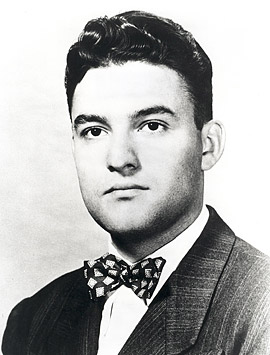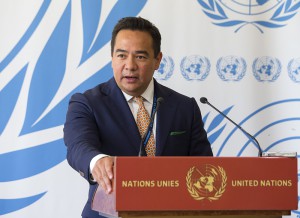Related Research Articles

The Native American Graves Protection and Repatriation Act (NAGPRA), Pub. L. 101-601, 25 U.S.C. 3001 et seq., 104 Stat. 3048, is a United States federal law enacted on November 16, 1990.
Larry J. Echo Hawk is an American attorney, legal scholar, and politician. A member of the Democratic Party, Echo Hawk served under U.S. President Barack Obama as the United States Assistant Secretary of the Interior for Indian Affairs from 2009 to 2012. He previously served as the Attorney General of Idaho from 1991 to 1995, the first Native American elected to the position, and spent two terms in the Idaho House of Representatives. In 2012, he was called as a general authority of the Church of Jesus Christ of Latter-day Saints. As of 2022, Echo Hawk is the last Democrat to have served as Attorney General of Idaho.

Tribal sovereignty in the United States is the concept of the inherent authority of Indigenous tribes to govern themselves within the borders of the United States.
Oliphant v. Suquamish Indian Tribe, 435 U.S. 191 (1978), is a United States Supreme Court case deciding that Indian tribal courts have no criminal jurisdiction over non-Indians. The case was decided on March 6, 1978 with a 6–2 majority. The court opinion was written by William Rehnquist, and a dissenting opinion was written by Thurgood Marshall, who was joined by Chief Justice Warren Burger. Justice William J. Brennan did not participate in the decision.

Jack Greenberg was an American attorney and legal scholar. He was the Director-Counsel of the NAACP Legal Defense Fund from 1961 to 1984, succeeding Thurgood Marshall. He was involved in numerous crucial cases, including Brown v. Board of Education, which ended segregation in public schools. In all, he argued 40 civil rights cases before the U.S. Supreme Court, and won almost all of them.

Kevin K. Washburn is an American law professor, former dean of the University of New Mexico School of Law, and current Dean of the University of Iowa College of Law. He served in the administration of President Barack Obama as Assistant Secretary for Indian Affairs at the U.S. Department of the Interior from 2012 to 2016. Washburn has also been a federal prosecutor, a trial attorney at the U.S. Department of Justice, and the General Counsel of the National Indian Gaming Commission. Washburn is a member of the Chickasaw Nation of Oklahoma, a federally-recognized Native American tribe.

Native American civil rights are the civil rights of Native Americans in the United States. Native Americans are citizens of their respective Native nations as well as of the United States, and those nations are characterized under United States law as "domestic dependent nations", a special relationship that creates a tension between rights retained via tribal sovereignty and rights that individual Natives have as U.S. citizens. This status creates tension today but was far more extreme before Native people were uniformly granted U.S. citizenship in 1924. Assorted laws and policies of the United States government, some tracing to the pre-Revolutionary colonial period, denied basic human rights—particularly in the areas of cultural expression and travel—to indigenous people.
Native American self-determination refers to the social movements, legislation and beliefs by which the Native American tribes in the United States exercise self-governance and decision-making on issues that affect their own people.
The Association on American Indian Affairs is a nonprofit human rights charity located in Rockville, Maryland. Founded in 1922, it is dedicated to protecting the rights of Native Americans.
Pan-Indianism is a philosophical and political approach promoting unity and, to some extent, cultural homogenization, among different Indigenous groups in the Americas regardless of tribal distinctions and cultural differences.
Santa Clara Pueblo v. Martinez, 436 U.S. 49 (1978), was a landmark case in the area of federal Indian law involving issues of great importance to the meaning of tribal sovereignty in the contemporary United States. The Supreme Court sustained a law passed by the governing body of the Santa Clara Pueblo that explicitly discriminated on the basis of sex. In so doing, the Court advanced a theory of tribal sovereignty that weighed the interests of tribes sufficient to justify a law that, had it been passed by a state legislature or Congress, would have almost certainly been struck down as a violation of equal protection.
The Native American Rights Fund (NARF) is a non-profit organization, based in Boulder, Colorado, that uses existing laws and treaties to ensure that U.S. state governments and the U.S. federal government live up to their legal obligations. NARF also "provides legal representation and technical assistance to Indian tribes, organizations and individuals nationwide."
Merrion v. Jicarilla Apache Tribe, 455 U.S. 130 (1982), was a case in which the Supreme Court of the United States holding that an Indian tribe has the authority to impose taxes on non-Indians that are conducting business on the reservation as an inherent power under their tribal sovereignty.
The following outline is provided as an overview of and topical guide to United States federal Indian law and policy:
Echohawk was a Pawnee leader, whose name became a surname. It can also refer to:
Bunky Echo–Hawk is a Native American artist and poet who is best known for his acrylic paintings concerning Native American topics and hip-hop culture. He works in a variety of media that include paintings, graphic design, photography, and writing.

In the Courts of the Conqueror: The 10 Worst Indian Law Cases Ever Decided is a 2010 legal non-fiction book by Walter R. Echo-Hawk, a Justice of the Supreme Court of the Pawnee Nation, an adjunct professor of law at the University of Tulsa College of Law, and of counsel with Crowe & Dunlevy.

Keith Michael Harper is an American attorney and diplomat who was the first Native American to ever receive the rank of a U.S. ambassador to the United Nations Human Rights Council. He is a member of the Cherokee Nation of Oklahoma and as a lawyer he is known for working on behalf of Native Americans. He was, from June 2014 to January 2017, the U.S. representative to the United Nations Human Rights Council in Geneva.
Lawrence Baca is a Native American attorney and was the deputy director of the Office of Tribal Justice with the United States Department of Justice.
References
- ↑ "The American Philosophical Society Welcomes New Members for 2024".
- 1 2 3 Human Rights Hero: John Echohawk Archived 2010-04-15 at the Wayback Machine , American Bar Association (Spring 2006).
- ↑ Achieving and Preserving the Promise of America Archived 2011-06-09 at the Wayback Machine , speech by Larry Echo Hawk (May 23, 1995).
- 1 2 The New Warriors: Native American Leaders Since 1900, edited by R. David Edmunds, University of Nebraska Press, 2004, pp. 299-322.
- ↑ Echohawk, John E. (Winter 2013). "Understanding Tribal Sovereignty: The Native American Rights Fund". Expedition. 55: 18–23 – via EBSCOhost.
- ↑ Hesse, Tom. "Interview: John Echohawk, a Boulder-based attorney, will receive Thurgood Marshall Award for his contributions to Native American rights". Colorado Public Radio. Retrieved 2023-07-31.
- ↑ "John E. Echohawk to receive ABA Thurgood Marshall Award". www.americanbar.org. Retrieved 2023-07-31.
The award honors U.S. Supreme Court Justice Thurgood Marshall for his commitment, in word and action, to the cause of civil rights. It is awarded to individuals in the legal profession to recognize similar long-term contributions to the advancement of civil rights, social justice and human rights in the United States. Echohawk, a member of the Pawnee Indian tribe, has been with the Native American Rights Fund in Boulder, Colorado, since its inception in 1970 and has served as its executive director since 1977.